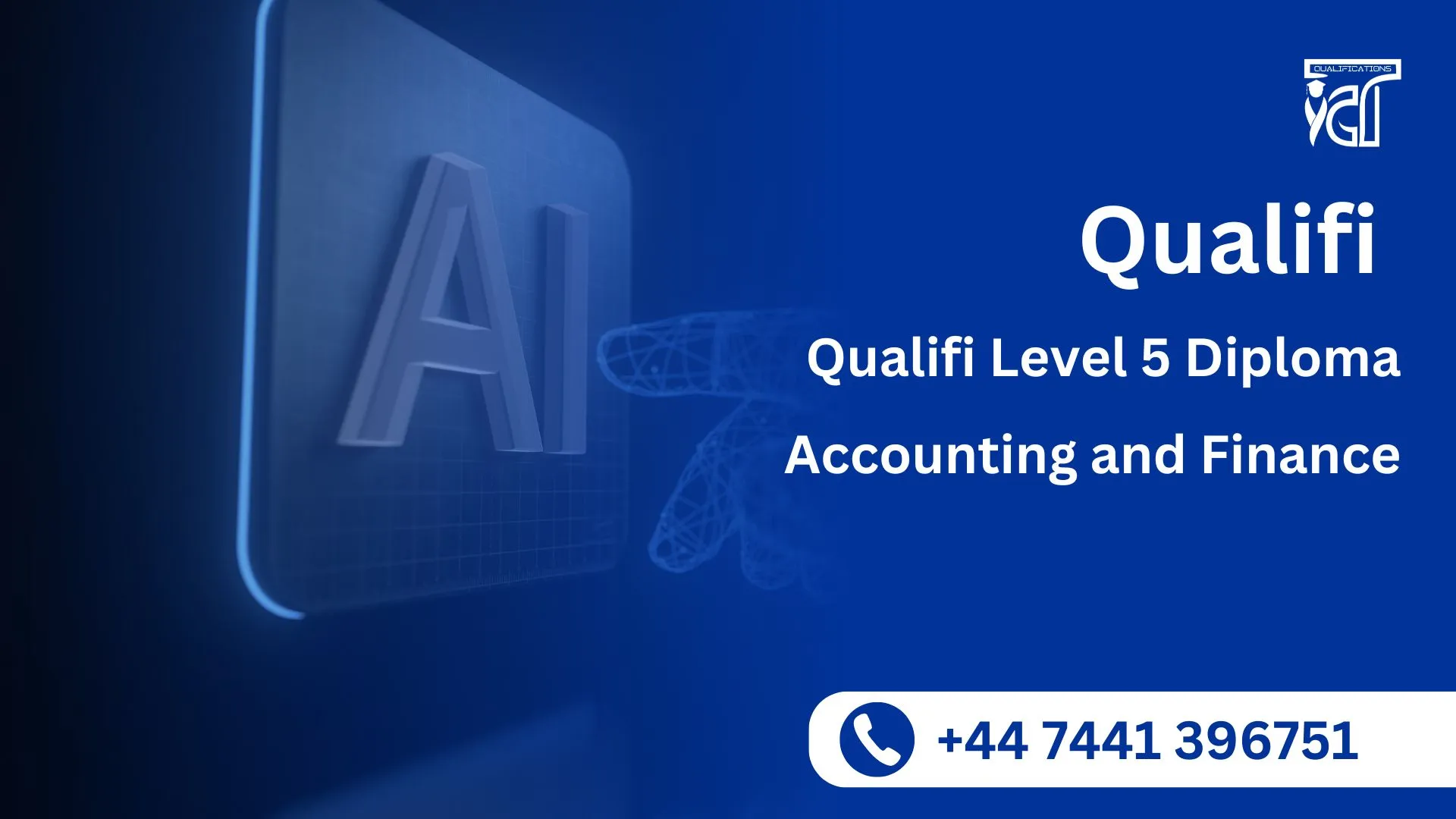Artificial Intelligence (AI) is transforming industries worldwide, creating a growing demand for skilled professionals who can develop, implement, and manage AI-driven solutions. The Qualifi Level 5 Diploma in Artificial Intelligence is designed to equip learners with advanced AI knowledge, providing them with the expertise needed to excel in this rapidly evolving field. This Ofqual-regulated qualification is entirely assignment-based, offering a flexible learning approach for those looking to enhance their career prospects in AI.
This diploma is tailored for individuals who want to deepen their understanding of AI technologies and apply them in real-world scenarios. The course focuses on practical applications, ensuring learners gain industry-relevant skills. Whether you are an IT professional, a data analyst, or an aspiring AI specialist, this qualification serves as a stepping stone toward higher education or career advancement in AI-related fields.
Unlike traditional exam-based courses, this qualification is entirely assignment-based, allowing learners to apply theoretical knowledge to practical projects. This approach enhances problem-solving skills and provides hands-on experience, making graduates more competent and job-ready.
The Qualifi Level 5 Diploma in Artificial Intelligence is a valuable qualification for individuals looking to establish or advance their careers in AI. With a focus on practical applications and industry relevance, this diploma prepares learners for high-demand roles in AI-driven industries. Whether you are looking to enhance your expertise or transition into AI, this qualification offers a flexible and recognized pathway to success.
The Qualifi Level 5 Diploma in Artificial Intelligence qualification consists of 6 mandatory units for Credit Equivalency 120 for the completed qualification.
| Sr# | Unit Title | Credits | GLH |
| 1 | Visualisation | 20 | 80 |
| 2 | Reinforce Machine Learning | 20 | 80 |
| 3 | Natural Language Processing | 20 | 80 |
| 4 | Human-AI Interaction | 20 | 80 |
| 5 | Advanced Deep Machine Learning | 20 | 80 |
| 6 | Introduction to Computer Vision | 20 | 80 |
GLH (Guided Learning Hours) and TQT (Total Qualification Time) are terms commonly used in vocational qualifications to help define the amount of time a learner is expected to spend on their studies.
1. GLH (Guided Learning Hours)
GLH refers to the number of hours a learner spends being directly taught, supervised, or supported during their course. This includes the time spent in activities such as:
- Classroom instruction
- Practical workshops
- One-on-one tutoring or mentoring sessions
- Online learning sessions with tutor support
In other words, GLH represents the time that learners are actively engaged with their instructors or learning activities.
2. TQT (Total Qualification Time)
TQT represents the total amount of time a learner is expected to invest in completing a qualification, including:
- GLH (Guided Learning Hours): Time spent on direct learning, as explained above.
- Self-Directed Learning: This includes time spent on independent study, research, assignment completion, preparation for exams, and any other work the learner does outside of direct teaching hours.
TQT is a broader measure that includes all the time required to achieve the qualification. It helps learners and employers understand the overall commitment required for the qualification.
Key Differences Between GLH and TQT:
- GLH focuses on direct learning with guidance or supervision.
- TQT includes GLH as well as independent study time and other learning-related activities.
Example:
If a qualification has a TQT of 600 hours and a GLH of 250 hours, it means the learner should spend 250 hours in direct learning (classroom, online, or tutor-led sessions) and 350 hours on independent study or research.
Learning Outcomes of Qualifi Level 5 Diploma in Artificial Intelligence
Visualization
- Understand the importance of data visualisation in business intelligence.
- Be able to carry out data preparation for visualization.
- Be able to use different visual representations for decision-making
- Be able to present visualizations using appropriate visualization tools.
Reinforced Machine learning
- Understand key concepts in Reinforced Machine Learning.
- Be able to apply reinforcement machine learning algorithms, libraries, and frameworks.
- Be able to analyse results of reinforcement machine learning.
Natural Language Processing
- Understand fundamental concepts in Natural Language Processing (NLP)
- Be able to use NLP libraries, frameworks, and other tools in text representations.
- Be able to use NLP methods and techniques to carry out sentiment analysis.
Human-AI Interaction
- Understand key theories and concepts in human-AI interactions
- Be able to carry out explainable AI techniques which take consideration of human factors and cognition.
- Understand design principles for collaborative human and AI systems.
Advanced Deep Learning
- Be able to review contemporary theories and concepts of deep machine learning.
- Understand advance Neural network architecture.
- Be able to use different techniques to improve performance of deep machine learning models.
- Use deep machine learning models on Natural Language Processing (NLP) and Reinforced Machine Learning (RML).
Introduction to Computer Vision
- Understand key concepts and principles of computer vision.
- Be able to perform object recognition and image segmentation.
- Be able to apply deep learning models in computer vision.
Course Benefits of the Qualifi Level 5 Diploma in Artificial Intelligence
- Industry-Relevant Knowledge – Gain advanced expertise in AI, including machine learning, natural language processing, and computer vision.
- Career Advancement – Enhance employability in AI-driven industries such as finance, healthcare, and technology.
- Practical Learning Approach – Develop hands-on skills through assignment-based assessments, ensuring real-world application.
- Flexible Study Options – Study at your own pace with no exam pressure, making it suitable for working professionals.
- Higher Education Pathways – Progress to Level 6 qualifications or pursue a bachelor’s degree in AI, data science, or computer science.
- Global Recognition – Earn a qualification regulated by Ofqual, recognized by employers and academic institutions worldwide.
- Ethical and Legal Understanding – Learn responsible AI development, ensuring compliance with industry standards and regulations.
Ideal Learner for the Qualifi Level 5 Diploma in Artificial Intelligence
This qualification is designed for individuals who:
- Aspire to work in AI and machine learning – Ideal for those seeking careers in AI-driven industries.
- Have a background in IT or related fields – Suitable for professionals with prior knowledge in computing, data science, or software development.
- Are looking to upskill or change careers – Perfect for those transitioning into AI from other technical or analytical roles.
- Prefer assignment-based learning – Best for learners who excel in coursework rather than exams.
- Seek career progression or further education – Ideal for professionals aiming for senior AI roles or pursuing advanced degrees.
- Have strong analytical and problem-solving skills – Suitable for those who enjoy logical thinking and data-driven decision-making.
- Meet the entry requirements – Must have a Level 4 qualification or relevant work experience, along with English language competency.
Entry Requirements
Register Now
Qualification Process
Qualification Process for the Qualifi Level 5 Diploma in Artificial Intelligence
- Self-Assessment:
Begin by evaluating your eligibility to ensure you meet the qualification requirements, including work experience, knowledge, and language proficiency. - Registration:
Complete your registration by submitting the required documents, including a scanned copy of a valid ID, and paying the registration fee. - Induction:
An assessor will conduct an induction to confirm your eligibility for the course and explain the evidence requirements. If you do not meet the criteria, your registration will be canceled, and the fee will be refunded. - Assignments & Evidence Submission:
Provide all assignments and the necessary evidence based on the assessment criteria outlined in the course. If you are unsure of the required evidence, consult with the assessor for guidance on the type and nature of evidence needed. - Feedback and Revision:
The assessor will review your submitted evidence and provide feedback. Evidence that meets the criteria will be marked as “Criteria Met,” while any gaps will be identified. You will be asked to revise and resubmit if needed. - Competence Evidence:
Submit final evidence demonstrating that all learning outcomes have been met. This evidence will be marked as “Criteria Met” by the assessor once it is satisfactory. - Internal Quality Assurance (IQA):
The Internal Quality Assurance Verifier (IQA) will review your evidence to ensure consistency, quality, and compliance with standards. - External Verification:
The IQA will submit your portfolio to Qualifi’s External Quality Assurance Verifiers (EQA) for final confirmation. The EQA may contact you directly to verify the authenticity of your evidence. - Certification:
Upon successful completion of all checks, Qualifi will issue your official certificate, confirming that you have attained the Qualifi Level 5 Diploma in Artificial Intelligence.







